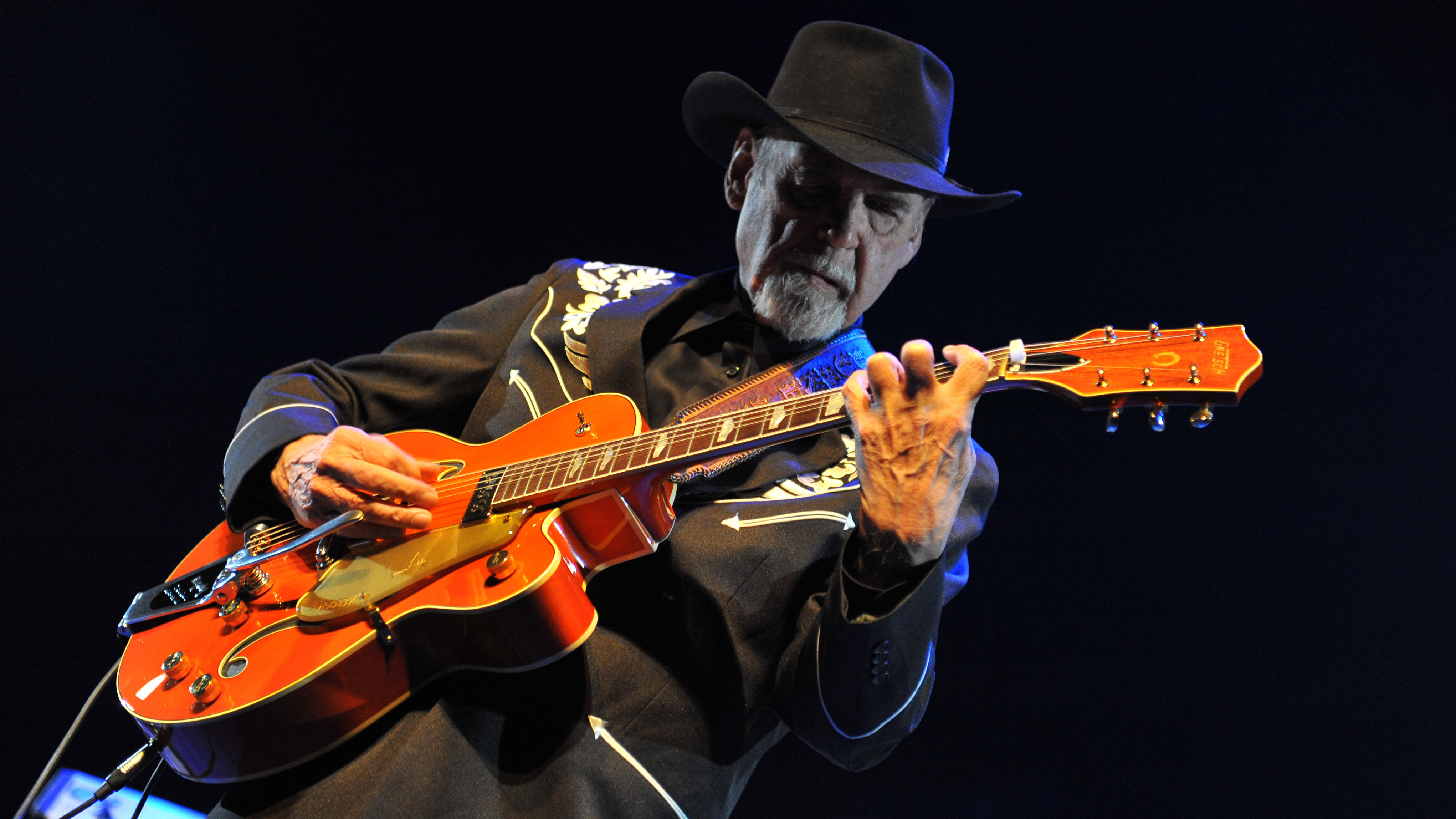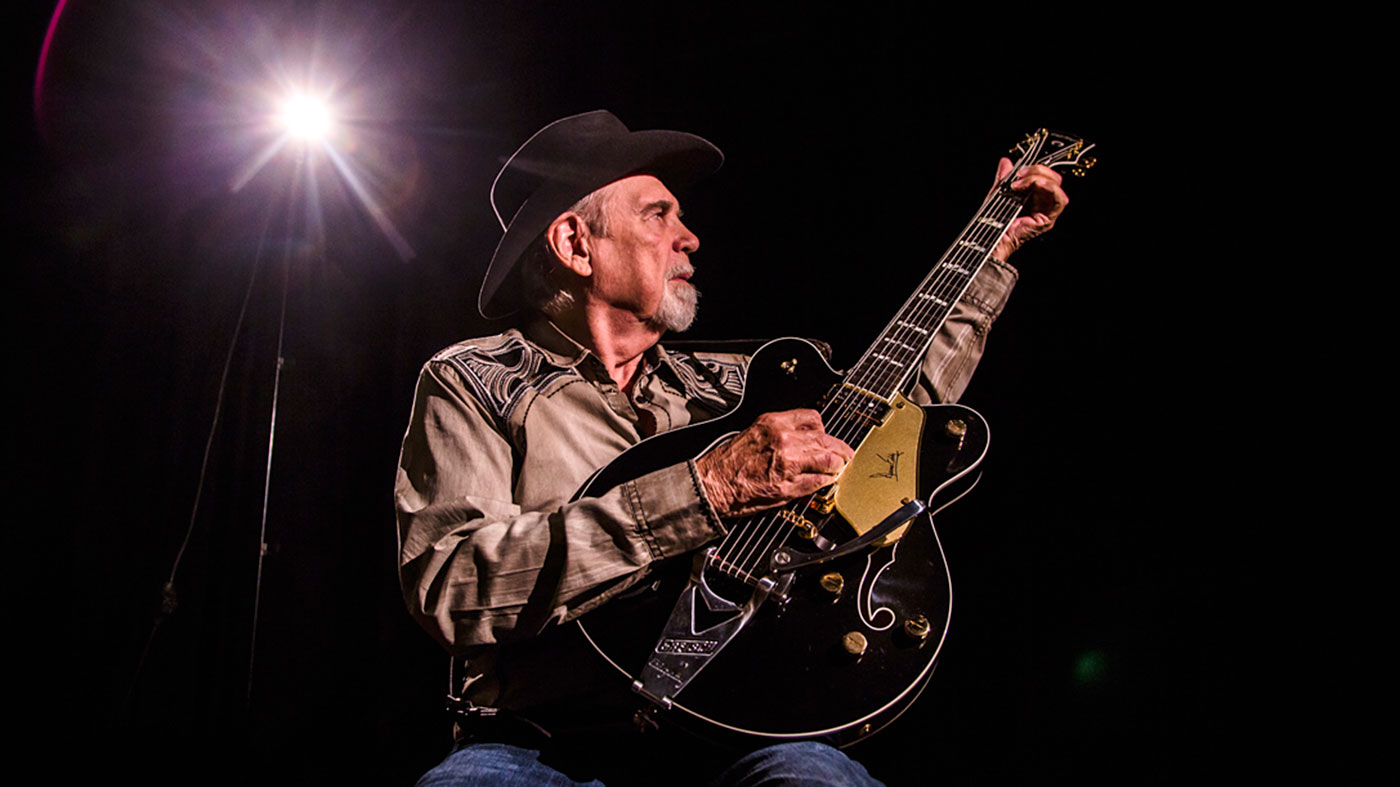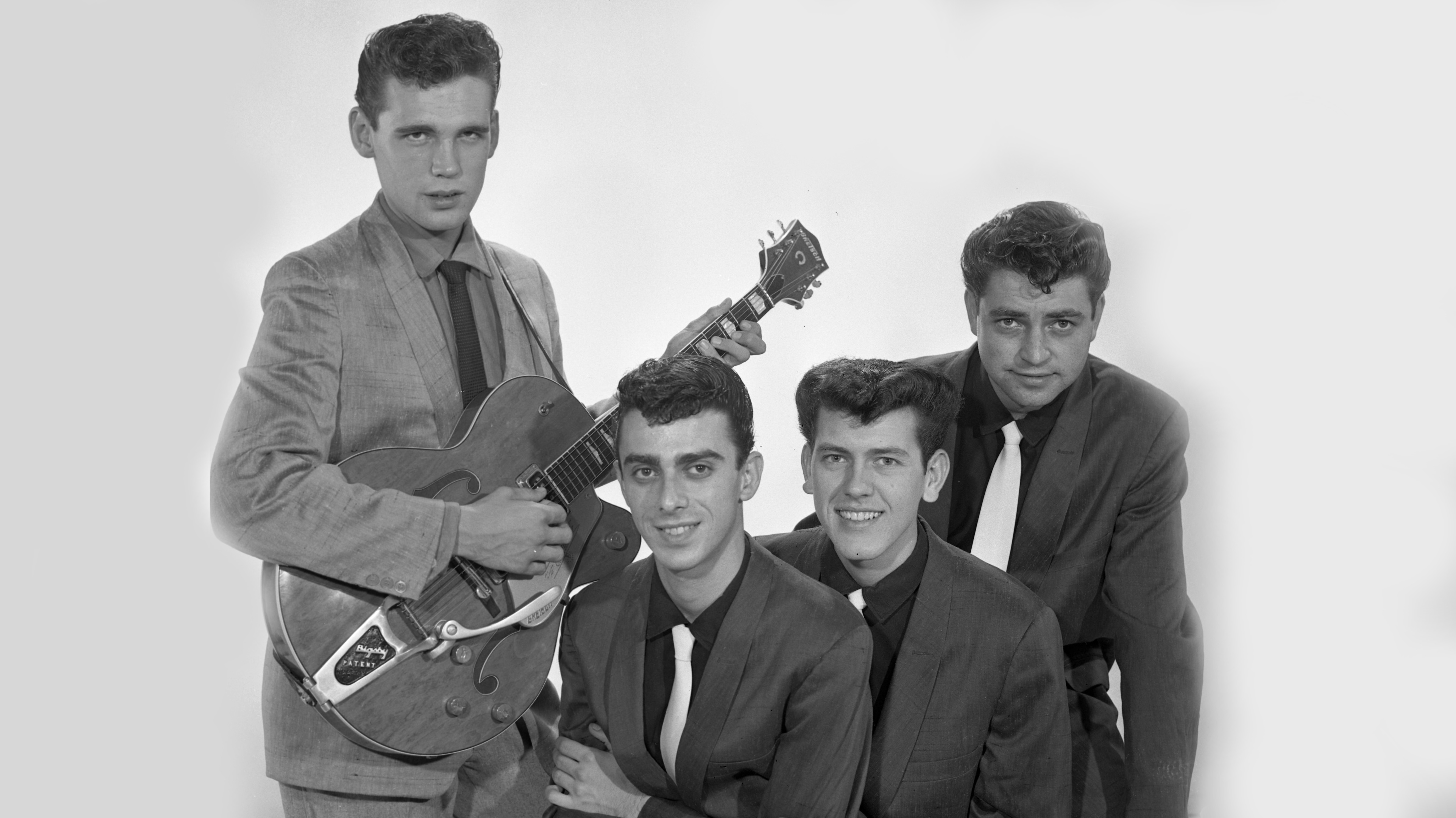Duane Eddy on a legendary life: "I remember Buddy Holly said, 'I wanna try your guitar'"
The guitar instrumental icon on his guest appearance for a new Johnny Cash album and a remarkable career in music

Instrumental guitar legend Duane Eddy’s bottom-string ‘twang’ is unmistakable. So when John Carter Cash needed ‘that’ sound on his father Johnny Cash’s latest posthumous album, recorded with the Royal Philharmonic Orchestra, who’s he gonna call?
With a slew of hits traversing decades from the 50s to the 80s, Duane Eddy is a legend of the guitar instrumental. Tracks such as Shazam, Peter Gunn, Because They’re Young and Play Me Like You Play Your Guitar, cemented the Duane Eddy sound into the minds of generations of music lovers.
Respected by his peers and the musicians that came after him, Eddy has worked with everyone from Buddy Holly, Chuck Berry and The Everly Brothers, to Paul McCartney, Ry Cooder, Waylon Jennings and even British avant garde popsters Art Of Noise. Their resurrection of his hit Peter Gunn featured in the movie Bridget Jones’s Diary and gained the guitarist a Grammy, almost 30 years after his arrival on the scene.
Duane Eddy’s sound is often chosen by producers to evoke a specific musical sound or era, and to that end he has recently featured with the Royal Philharmonic Orchestra on posthumous albums by Elvis Presley and, most recently, Johnny Cash.
MusicRadar caught up with Duane by phone to his Nashville home to talk about the Cash and Presley albums, his own playing style, and to reveal some fascinating tales from an extraordinary career.
Can you tell us how the Johnny Cash album came about, and what your involvement entailed?
"Well, John Carter Cash looks after his Dad’s back catalogue and he called me up and asked if I’d like to play on the song, Farther Along. So I went over to the Cash cabin, where Johnny used to go to write songs, or have some privacy, and we recorded the track."
Get the MusicRadar Newsletter
Want all the hottest music and gear news, reviews, deals, features and more, direct to your inbox? Sign up here.
It’s a beautiful sounding song, and really emotional
"Yeah. It’s a beautiful arrangement. John Carter Cash is a great producer and he really looks after his father’s legacy."
When you worked with the Royal Philharmonic on the record, how did the process work?
"Well, Johnny Carter Cash sent me a demo of the track with the strings and Johnny on it, with a little opening where I’d play. The song was in A which is one of my favourite keys, and works great for my sound. It’s a country key, and Johnny liked singing in that key too. So I took my guitar and amp and went out to the Cash cabin, set up, and Chuck the engineer, Trey the studio manager and John Carter Cash were all there.
"I also took my guitar tech friend, who was Eddie Van Halen’s tech for decades and he now works for Gretsch. So I ran though it a few times; John Carter Cash made a couple of suggestions, which I did, and we were done. It was a very pleasant experience because John is a great producer. Every artist needs that."
You also played on the 2015 Elvis album with the Royal Philharmonic, If I Can Dream
"Actually I played a lot more than you hear on those tracks [An American Trilogy and Bridge Over Troubled Water], but they took me off most of it. They were also doing the string thing which everybody loved, and I don’t blame them, but they wanted to hear more of that than they did of me. I was distracting from it, I think."
When you did those recordings, with Johnny and Elvis’s voices right there with you, that must have been an eerie, spine-tingling experience…
With John, it was like he was in the next room. Of course we often record like that anyway, they separate us in different rooms like that. So yes, it was a spine-tingling moment.
Did you know Johnny Cash?
"Yes I did. He was there at the beginning of rockabilly."
Did Johnny’s guitarist Luther Perkins influence you or were you both coming up at the same time?
"I didn’t really think about it until recently, but then I realised that both of us seemed to work down on the bass strings. We probably took little things from each other, as musicians do."

"I did a few sessions and realised the bass strings were much more powerful"
Why did you use the bass strings and not go for the high notes like almost everybody else?
"Well, I did a few sessions and realised the bass strings were much more powerful. That’s where most people played riffs, but how many riffs can you come up with? So I thought, ‘why not play the melody down on those strings?’ And that’s where I wrote most of my things, with Lee Hazlewood - even if he didn’t help write all the melodies he added so much to the backing that I thought it was worth splitting. We were only splitting pennies back then anyway."
On the Elvis Presley album with The Royal Philharmonic, in American Trilogy and Bridge Over Troubled Water your sound is instantly recognisable. Several guitarists fall into that category – BB King, Mark Knopfler, Hank Marvin, Jimi Hendrix… a few others, and yourself.
"Eddie Van Halen was one, also. I think everybody’s got their own touch and tone. I always compare it to fingerprints. Everybody’s different. Even if you play the same lick, everybody will sound different; different accent, different feel.
"I had a lot of imitators – Glen Campbell was one, on Wichita Lineman. Glen was a session player when I first met him in 1962. He was on pretty much all my sessions for about two years. We’d have four or five guitar players, a keyboard player, drummer, bass player, a couple of horns sometimes."
You had Larry Knechtel on your records too, one of the greatest, perhaps unsung, session players of all time. Larry played bass on The Byrds’ Mr Tambourine Man, lead guitar on David Gates/Bread’s Guitar Man, and piano on Simon And Garfunkel’s Bridge Over Troubled Water, for which he won a Grammy!
"Larry became the most beloved one of all. They all had such respect for him. He was one of the world’s finest pianists and he went on the road with me. We were at a gig one night and the piano was all torn up. The theatre owner came up and apologised and Larry said, 'I don’t think I can play anything on this.' Strings were broken and everything. The theatre owner said, 'Well, we had Jerry Lee Lewis here last night.' Say no more!

"Larry played bass for me, too. Our bass player left with two weeks’ notice so Larry said he’d like to try, but he didn’t have a bass guitar. So I said, 'We are in New York next week, we can just buy one at Manny’s.'
When he played it, though, I thought, ‘Well, a bass does count after all’. I remember Ry Cooder was working on a session with me one day and he was talking about the innovative bass playing on Mr Tambourine Man. One of the other guys on the session said that it was Larry. 'That was Knechtel?’ said Ry. Larry became first call in Hollywood on the Wrecking Crew, but you had to specify whether you wanted piano or bass.
"Another session mate of his was David Gates. David would arrange some things on my RCA albums, and Larry would play either bass or piano. In the early 70s David asked him to join him in Bread full time, and that’s how he got to play guitar on Guitar Man. He was in the session all day with David who was trying to get a sound he heard in is head for the solo.
"It must have been around 10 o’clock at night and Larry was thinking, ‘Man I’d sure like to go home and go to bed’. David had tried about six or eight guitar players and when the last guy came out, David said, “Thanks, man, but it’s still not what I want to hear. I’ll know it when I hear it.” Larry said to the guy, 'Can I borrow your equipment?' David said, 'I didn’t know you played guitar?'
"Larry said, 'I don’t, but I think I know what you want.” So he went in and played it and David jumped up and said, “That’s it!” And that first take is what you hear on the record."
Back in the early times, instrumental guitar music was such a big thing, with yourself, The Ventures, Dick Dale, The Chantays, The Shadows over here...
"I knew all of them. Dick and I became friends finally when he was inducted into the Musicians Hall of Fame here in Nashville. We had a big conversation and a big hug and he was as sweet as he could be.
"I did a couple of tracks with The Ventures. Bob Bogle [Ventures’ guitarist] was sitting the studio one day and I had one of these ‘moments’… I’ve had a few of these over the years, like playing at the Grand Ole Opry, which was a dream of mine; or Glen Campbell asking me what I thought of his solo on Wichita Lineman. I said, “Glen, if you played any better I’d have to break your damn fingers!” He roared with laughter.
"I actually got to play his part on a live show up in Lake Tahoe when he came up there to work. I’m playing his solo and he’s doing the high part – the ‘di-deet, di-deet, di-deet-deet-deet, de-de-deet…’ and singing it. That serendipity thing, you know… Likewise, getting back to Bob Bogle, he was sitting there and he played Walk Don’t Run, all the way through. It was another of those ‘moments’".
"Eddie Cochran was a dear friend, also. I was with him a couple of days before he died, staying in the same hotel off Oxford Street in London"
You must have known and worked with many of the great rock bands and vocalists, too…
"Oh yeah. The first big show I did was with Alan Freed [legendary DJ and impresario] in late 1958. It was The Every Brothers, Chuck Berry, Bill Haley, The Kalin Twins plus many others.
"Eddie Cochran was a dear friend, also. I was with him a couple of days before he died, staying in the same hotel off Oxford Street in London. He came in and we greeted each other. Went up to his room and he was with his fiancée Sharon Sheeley. She was a great songwriter too – wrote Poor Little Fool for Ricky Nelson among other things.
"We swapped guitars. They had similar necks but I think mine had the best neck in the business. Everyone used to say that. I remember Buddy Holly and I were passing each other going to and from the stage one day and Buddy said, 'I wanna try your guitar,' and I took his Strat and he took my Gretsch. He said, 'Man, this has got a great neck!'
"I did another one with Les Paul. We were doing something for this posh magazine and Les and I were just sitting around while they were getting the lights sorted out and he says, 'Let’s swap guitars and see if anyone notices.' So I was playing Les Paul’s Les Paul. I realised this was another of those ‘moments’! He said, 'Nice neck!' The guy said, 'Are you guys playing the right guitars?' Les just cracked up."
"He opens one of these cases and hands the guitar to me. Man, it settled in there so sweet. That neck – it was ‘my’ guitar."
You got your first Gretsch when still in your teens. That must have been something?
"Yeah, it was 1957 and I was 19. I didn’t even intend to buy it. I was actually looking at a White Falcon but it was too expensive - $700 or something. So I gave it back to Ziggy, the guy that owned the store, and he hung it back up on the wall. But then he said, 'I’ve got something you might like'. So he went over to this shelf full of guitar cases. He opens one of these cases and hands the guitar to me. Man, it settled in there so sweet. That neck – it was ‘my’ guitar.
"He said, “Have you got your Les Paul with you?” I said, 'Yeah, it’s in the trunk.' He said, 'Bring it in and let me see it.' So I brought it in and he said, 'Well I can give you $65 on it' – I’d only paid $75 or $80 for it. But I was still only 19 and you had to have your dad sign for you, but he wasn’t going to be back in town for a couple of weeks.
"So I started packing up the Les Paul but Ziggy said, 'Don’t you want to take the Gretsch?' Anyway, he let me have it without signing for it. And I’d just got my new Magnatone amp so I was a happy camper when I went to work that night."
"That Magnatone was the best amp in the world back then, even better than the Standell that Chet Atkins used"
Was that your regular amp then? What do you use now?
"I had a homemade ‘orange crate’ amp when I started in about 1954. In 1957 I finally bought a Magnatone. A couple of musician friends, a guitarist and a steel player, modified Magnatone amps. They’d put a 15” JBL speaker in it, and a 100-watt power pack, and a tweeter for the high end. Then they covered it in black with white grille cloth. They did that for this steel player for $100, and then the same for me.
"It was that amp I used the night I got my Gretsch. We had a De Armond tremolo sat on the top of the amp and that was how you got your tremolo. But that Magnatone was the best amp in the world back then, even better than the Standell that Chet Atkins used. I use Fenders now because they’ve pretty much caught up."
"One time in Liverpool they had to have police dogs to hold the crowds back, to make an aisle so the guys and I could get to the stage door"
You were always held in very high esteem with other musicians like The Beatles, Mark Knopfler, Hank Marvin, not to mention Art Of Noise who you also worked with.
"That was a lovely thing. It was like a bonus after the hits faded away and I was just doing occasional shows and recording the odd album here and there. Then in 1975 Tony Macaulay got me a hit in England with Play Me Like You Play Your Guitar. And I went back in 1984/85 to do the Peter Gunn thing with Art Of Noise.
"So I was still having hits in the 80s and I even won a Grammy for that – ‘Best Rock Instrumental’. It was incredible. I’ve had an amazing life. All those ‘moments’ I’ve talked about. And meeting Elvis, spending the whole night talking to him with Priscilla, in Vegas. Amazing!"
We really took to you over this side of the pond, didn’t we?
"Yes you did. They did here too, but we’re so spread out that I could work in Chattanooga and they wouldn’t hear about it in Nashville. I do still turn up in ‘favourite guitar player’ charts over here. But England, it was special. If I played in Liverpool you’d hear about it in Birmingham, or Sheffield, Southampton and so forth. They knew I was there so that made it seem bigger than it was here.
"And those theatres were acoustically perfect. The piano needed micing up, and maybe the sax, but the drums didn’t and I didn’t. What got the kids was that we sounded exactly like we did on the record. I took the same musicians, my best band, with Jim Horn, Larry Knechtel and so on.
"One time in Liverpool they had to have police dogs to hold the crowds back, to make an aisle so the guys and I could get to the stage door. It was amazing! Also on that first tour, Tommy Steele sent me a little picture with 'Good luck on your tour' on it, and I pinned that up in every dressing room I had. That was such a cool thing because I knew how big he was over there."
Once the whole Covid-19 thing is over, do you intend to go back to touring?
"I don’t know if I’ll go back to work, I’m getting too damn old now! But I’m working on a documentary, and writing an autobiography. But sometimes I get so sick of me I can’t continue. I think, ‘nobody’s gonna want to read this.’
We beg to differ, Duane...
Johnny Cash And The Royal Philharmonic Orchestra is out now on Columbia/Legacy Recordings. For orders head here.
“Its mission is simple: unleash the power of any amplifier or line-level source without compromise”: Two Notes promises a “watershed” in tube amp control with the Torpedo Reload II
MusicRadar deals of the week: Enjoy a mind-blowing $600 off a full-fat Gibson Les Paul, £500 off Kirk Hammett's Epiphone Greeny, and so much more









